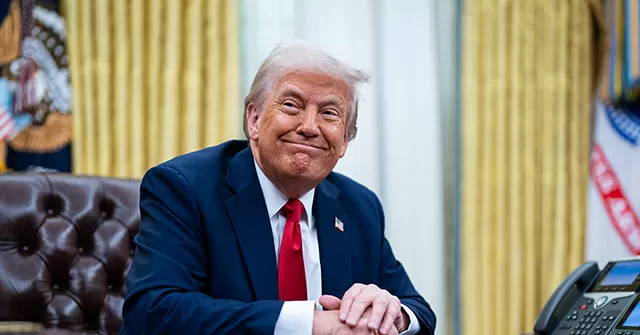Uncertainty isn’t always economically harmful. In fact, it can often lead to unexpected opportunities and growth. This is exactly what President Trump’s “Liberation Day” tariffs may bring to the U.S. economy. While many may view tariffs as a threat to economic stability, they may actually be the key to breaking out of the low-investment, high-dependence trap that the free trade consensus has left us in.
For decades, free trade has been hailed as the solution to all economic woes. It has been promoted as the path to increased competition, lower prices, and a more interconnected global market. However, as we have seen in recent years, this approach has not brought the promised benefits to the American economy. Instead, it has resulted in a decline in American manufacturing and a heavy reliance on imported goods.
But now, President Trump is challenging this traditional economic mindset with his “Liberation Day” tariffs. These tariffs are aimed at protecting American industries and encouraging domestic production. While some may fear the short-term effects on the economy, they fail to see the long-term benefits that these tariffs could bring.
Firstly, the tariffs will create a level playing field for American industries. Currently, the U.S. faces unfair competition from countries that heavily subsidize their own industries, making American goods less competitive in the global market. By imposing tariffs, the President is taking necessary steps to protect American businesses and workers from this unfair advantage.
Moreover, the tariffs will incentivize companies to invest in domestic production. For too long, American companies have been outsourcing their manufacturing operations to countries with lower labor costs. This has resulted in a decline in domestic investment and a heavy dependence on imported goods. The “Liberation Day” tariffs will encourage companies to bring these operations back to the U.S., creating more job opportunities for American workers and boosting the economy.
In addition, the tariffs will also promote innovation and growth in American industries. With a more level playing field and increased domestic investments, American companies will be forced to become more competitive and find innovative ways to improve their products and processes. This will not only benefit the American economy, but it will also position our country as a leader in technology and innovation.
Some may argue that the tariffs will lead to a trade war and ultimately harm the economy. However, history has shown us that tariffs can be successful in boosting economic growth. In the 1980s, President Reagan implemented tariffs on Japanese motorcycle imports, which resulted in the growth of the American motorcycle industry and job creation. Additionally, President Trump’s recent tariffs on steel and aluminum have already led to the reopening of closed factories and the creation of new jobs.
The fear of a recession due to the tariffs is also unfounded. The fact is, the U.S. economy is strong and resilient. It can withstand short-term fluctuations and adapt to long-term changes. The “Liberation Day” tariffs may cause some initial disruptions, but in the long run, they will lead to a more self-sufficient and thriving economy.
The tariffs may even have a positive impact on the global economy. As American industries become more competitive, they can also increase exports, creating a more balanced trade relationship with other countries. Additionally, the tariffs may encourage other countries to re-evaluate their own trade policies and practices, leading to fairer and more mutually beneficial trade agreements.
In conclusion, President Trump’s “Liberation Day” tariffs may be the unexpected opportunity that the American economy needs. Instead of being seen as a threat, these tariffs should be embraced as a move towards a more self-sufficient and prosperous economy. They will level the playing field, promote domestic investment, and drive innovation and growth in American industries. Let us embrace this uncertainty and look forward to a brighter economic future for our country.






![Complete BritRail Pass Guide [Types, How to Use It, Pros + Cons]](https://inside-news.uk/wp-content/uploads/2025/06/00221EB4-BCA2-4DBB-6CD4-83DBC37D71FA-120x86.webp)















